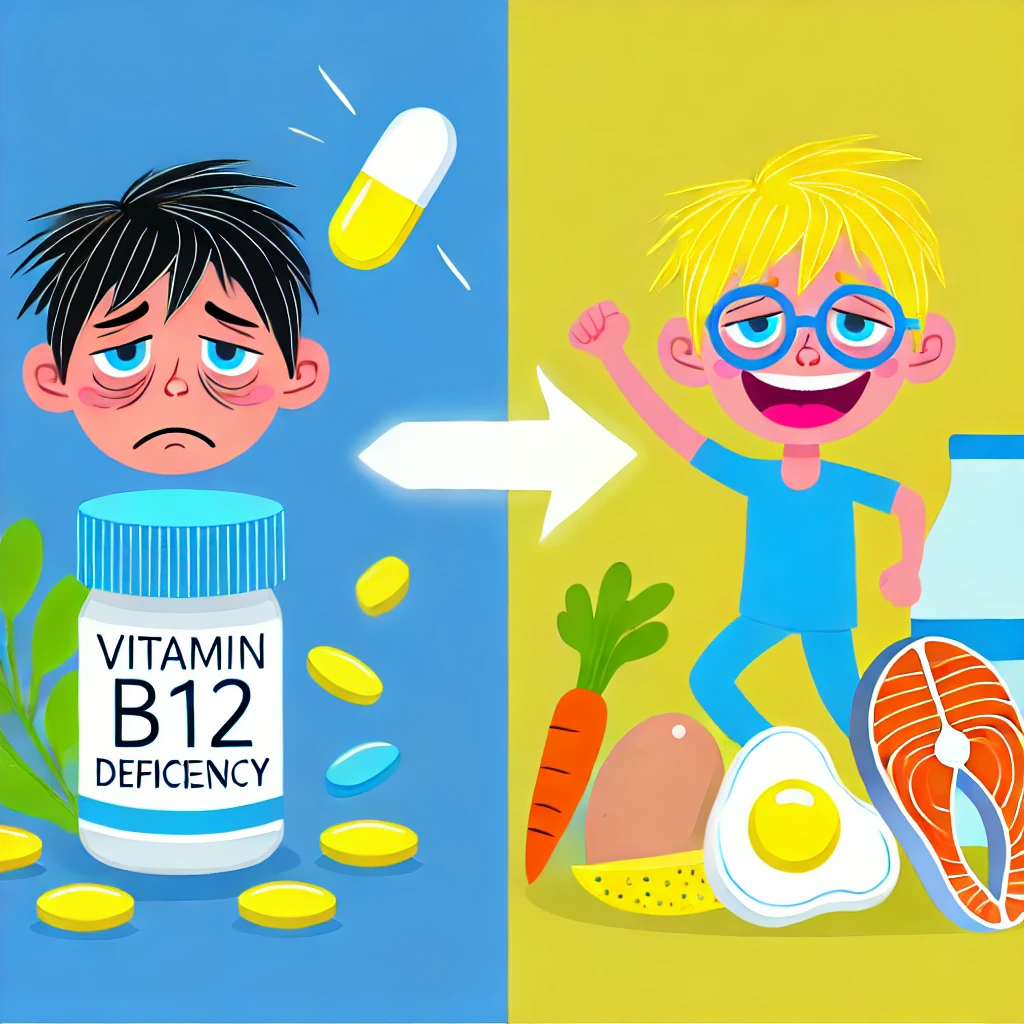
Vitamin B12 Deficiency: Recovery Time, Symptoms, & Treatment

Quick Guide: How Long to Recover from Vitamin B12 Deficiency
Wondering how long to recover from vitamin B12 deficiency? Most people start feeling better within 4 to 6 months of treatment, but full recovery can take up to a year. Factors like diet, health conditions, and treatment methods affect recovery time. In this article, we’ll cover what to expect during your recovery, common symptoms, and the best treatment options.
Key Takeaways
Recovery from vitamin B12 deficiency varies by individual, generally taking from a few months to up to a year, influenced by factors like diet and severity.
Recognizing early symptoms such as fatigue and cognitive issues is vital for timely intervention, preventing further complications.
A combination of supplements, dietary adjustments, and regular monitoring is essential for effective treatment and long-term management of vitamin B12 deficiency.
Recovery Duration for Vitamin B12 Deficiency

The path to recovering from a vitamin B12 deficiency varies among individuals, depending on their unique circumstances. Improvement in vitamin B12 levels is typically seen over the span of several months up to a year after initiating treatment, with many noticing changes between 4 and 6 months into therapy. Still, for some people, the progression towards full recovery could continue for as long as one year.
Factors such as dietary habits, previous gastrointestinal surgeries, and pre-existing health conditions significantly influence how quickly you recover. Those who have pernicious anemia or other related issues that affect nutrient absorption may find their recovery pace differs from those whose deficiencies stem purely from diet.
Lifestyle choices and how severe your initial b12 deficiency was can also play crucial roles in determining your recuperation timeline. A more pronounced deficit might necessitate an extended period of rehabilitation. It’s imperative to work alongside healthcare experts when devising a tailored strategy suitable for addressing these factors within your healing plan.
Ultimately persistence with adherence to the prescribed treatment regimen is vital during this often-prolonged journey toward wellness. Grasping what influences your convalescence will equip you with realistic expectations that sustain motivation along the way.
Key Symptoms of Vitamin B12 Deficiency
Identifying the early signs of vitamin B12 deficiency is crucial for a more efficient recovery. The initial symptoms commonly manifest as fatigue and irritability, which are often accompanied by an overall sense of low energy. These early indicators might be easily dismissed as merely the result of routine tiredness or stress.
As vitamin B12 deficiency becomes more advanced, individuals may experience increasingly severe health issues. An elevated heart rate often arises in those with anemia related to a lack of vitamin B12. Neurological symptoms that impact muscle strength and cause sensations such as numbness or tingling in extremities can emerge, alongside difficulties with coordination – these signals potential harm to the nervous system.
Cognitive challenges and memory problems also present major warning signs. Should you notice yourself grappling with issues remembering things or thinking clearly, it’s imperative to consult a healthcare provider immediately. Other common markers include rapid breathing patterns, headaches, and changes like tenderness or smooth texture on your tongue—these too suggest possible B12 deficiency.
Promptly recognizing these varied manifestations allows for swift medical attention that can stop Deterioration from occurring while facilitating faster recuperation times.
Diagnosing Vitamin B12 Deficiency
To confirm a diagnosis of vitamin B12 deficiency, several blood tests are administered that can accurately assess your body’s vitamin content. These typically begin with a complete blood count (CBC) and measurements of serum B12 and folate levels. Upon examination of the blood smear, hypersegmented neutrophils may be observed, which suggests macrocytic anemia often caused by a lack of B12.
In instances where healthy red blood cells exhibit an increased mean corpuscular volume (MCV), it signals their enlarged size due to the presence or absence of adequate vitamin b12. Should preliminary testing fail to definitively diagnose a deficiency in Vitamin b12, conducting additional evaluations for methylmalonic acid (MMA) and homocysteine could provide clarity when faced with borderline B12 values.
Identifying the root cause behind this nutritional shortfall is essential through Investigations which might include scrutinizing one’s medical history for potential gastrointestinal complications. Promptly addressing and treating vitamin b12 deficiencies is crucial since allowing them to persist without intervention can lead to permanent damage.
Treatment Options for Vitamin B12 Deficiency

Several strategies can be employed to address vitamin B12 deficiency, with the approach tailored based on its severity and root cause. Administration of supplemental vitamin B12 remains a prevalent method, offered in multiple formats. Patients may find high-dose oral supplementation just as beneficial as intramuscular injections, while others might prefer sublingual tablets, lozenges or nasal sprays.
Amending one’s diet is another critical element for remedying this condition. It’s important to ensure that foods abundant in vitamin B12 or those that have been fortified are part of regular consumption habits. This becomes particularly crucial for individuals adhering to vegan or vegetarian diets where naturally occurring sources are limited. These populations should actively seek out fortified products or include supplementary forms of B12.
Those diagnosed with pernicious anemia typically need ongoing treatment involving regular injections of vitamin B12 throughout their lives because they cannot absorb it adequately through food alone. The frequency at which these shots must be administered may vary from monthly to every three months following the initial phase of therapy and blood transfusions could become necessary if the situation is particularly severe.
Selecting an appropriate treatment strategy plays a vital role in recovery efficacy when dealing with b12 deficiency issues. Working closely alongside a healthcare provider will help craft a specific plan geared towards effective management and resolution of the deficit ensues ensuring proper healing processes take place.
Factors Affecting Recovery Time
The recovery timeline from a vitamin B12 deficiency can be influenced by multiple elements. A crucial factor is the initial depth of the deficit, with severe cases often necessitating a longer time to recuperate compared to lesser deficiencies.
How one goes about treating this condition is pivotal in determining the pace at which they recover. Making dietary changes and ensuring adequate supplementation with this essential nutrient are steps that can notably accelerate healing.
It’s equally important not to disregard the psychological toll that may accompany b12 deficiency. The stress and disappointment stemming from enduring such a health issue could alter an individual’s perception regarding their recovery timeframe. Recognizing these various aspects helps in forming sensible expectations while emphasizing the need for an all-encompassing therapeutic strategy.
Expected Improvement Timeline

Patients undergoing treatment for vitamin B12 deficiency may begin to experience symptom relief in just a few days. Early signs of recovery include heightened energy and diminished tingling sensations. Typically, most symptoms show significant improvement within weeks of starting therapy, and with the correct intervention, progress can persist over several months.
Those receiving injections of vitamin B12 might observe a positive change as soon as 48 to 72 hours post-treatment. Recovery duration could be prolonged in instances where severe deficiencies or absorption complications are present. Improvement in memory and mental functions can take longer. Hence continuous monitoring of vitamin B12 levels is essential to evaluate healing processes.
Understanding this timeline is important as it helps set realistic expectations for patients and reinforces their dedication to adhere to prescribed treatment regimens.
Emotional and Physical Challenges During Recovery

Recovery from a vitamin B12 deficiency is a journey filled with emotional and physical challenges. Being patient and celebrating small victories is important. Recovery requires time and persistence. It may take several months for symptoms to fully improve.
Common symptoms during recovery include exhaustion, pale skin, and tingling in the hands. Long-lasting symptoms like numbness, tingling, and weakness can persist even after treatment has begun. Memory problems may improve, but some deficits might remain long-term.
Engaging in cognitive rehabilitation and therapy can assist with improvement. Emotional support from friends, family, or support groups can also make a significant difference during the recovery process.
Long-Term Management and Prevention
Continuous management of vitamin B12 deficiency requires ongoing vigilance and precautionary steps. Those who may be susceptible need to make certain that they include foods fortified with vitamin B12 in their diets to maintain sufficient quantities. It’s essential for individuals, particularly those who refrain from eating animal products, to integrate natural sources of vitamin B12 into their daily nutrition.
Overcoming a deficiency in vitamin B12 might give rise to psychological hurdles which include feelings of anxiety and incidences of panic attacks. Providing emotional support along with counseling can provide substantial assistance to those grappling with these issues.
Taking an active stance on regulating levels of vitamin B12 is key in averting subsequent shortages and preserving the healthfulness overall.
When to Seek Medical Advice
It’s essential to consult with a healthcare professional if you notice signs such as persistent tiredness, heart palpitations, difficulty breathing or a tender tongue without an obvious cause. Putting off seeking medical help could result in irreversible harm to nerve cells.
Specific populations should be particularly vigilant about their vitamin B12 intake. These include those adhering to a vegan diet, individuals over 50 years old, people of African-American or Northern-European heritage, and persons with autoimmune conditions or who have undergone gastrectomy. It is vital for them to check in with their physicians regarding their B12 levels, especially if they encounter ongoing or intense symptoms indicative of vitamin b12 deficiency.
Catching and addressing a potential B12 deficiency early on can stave off more serious health complications down the line and allow for better control over the condition overall.
Summary
To recuperate from a vitamin B12 deficiency, it’s important to grasp the duration of recovery, be aware of the symptoms, and adhere to proper treatment protocols. Ongoing tracking and preventive strategies are critical for sustained management.
Taking initiative by obtaining prompt medical consultation is crucial in managing vitamin B12 deficiency effectively and upholding your overall well-being. Keep in mind that your path toward healing is distinctive. Being knowledgeable about and dedicated to your prescribed treatment plan will have a significant impact on your progress.
Frequently Asked Questions
How long does it take to recover from vitamin B12 deficiency?
Healing from a vitamin B12 deficiency typically spans between 4 to 12 months, and substantial improvements are usually observable within the initial 4 to 6 months of that period.
Monitoring your recovery is essential for ensuring successful recuperation from b12 deficiency.
What are the common symptoms of vitamin B12 deficiency?
Vitamin B12 deficiency commonly presents with fatigue, irritability, muscle weakness, tingling in the hands and feet, increased heart rate, and cognitive disturbances.
It’s crucial to recognize these symptoms early for proper management.
How is vitamin B12 deficiency diagnosed?
Vitamin B12 deficiency is diagnosed through blood tests, including a complete blood count (CBC), serum B12 and folate levels, and possibly additional tests like methylmalonic acid (MMA) and homocysteine levels.
These tests provide essential insights into your vitamin B12 status.
What are the treatment options for vitamin B12 deficiency?
Vitamin B12 deficiency can be treated effectively with high-dose oral supplements, intramuscular injections, sublingual tablets, nasal sprays, and dietary modifications.
It’s essential to address this deficiency to prevent serious health complications.
When should I seek medical advice for vitamin B12 deficiency symptoms?
If you are exhibiting symptoms of vitamin B12 deficiency, such as inexplicable exhaustion, heart palpitations, difficulty breathing or a painful tongue, and you follow a vegan diet or fall into the senior age bracket, it is essential to consult with a healthcare professional.
It is important for your well-being that swift measures be taken in response to these health concerns.







Leave a comment
This site is protected by hCaptcha and the hCaptcha Privacy Policy and Terms of Service apply.